Orcas Sink 50-Foot Yacht Off the Coast of Morocco
The vessel’s two passengers were evacuated onto an oil tanker in the Strait of Gibraltar. The incident marks the fifth vessel the mammals have sunk in recent years
/https://tf-cmsv2-smithsonianmag-media.s3.amazonaws.com/accounts/headshot/SarahKuta.png)
Daily Correspondent
:focal(2550x1591:2551x1592)/https://tf-cmsv2-smithsonianmag-media.s3.amazonaws.com/filer_public/bb/86/bb862a6b-11d3-43d1-aa5a-860f62343f1f/gettyimages-639203690.jpg)
The boat-ramming orcas are back in action: Two people had to be rescued from a sailing yacht in the Strait of Gibraltar after the black-and-white marine mammals damaged the vessel so badly it later sank, reporters Reuters ’ David Latona.
The incident occurred around 9 a.m. local time Sunday, some 14 miles north of Cape Spartel in northern Morocco. Passengers aboard the 50-foot Alboran Cognac felt blows to the yacht’s hull and saw that the rudder had been damaged. As water began leaking onto the ship, they contacted the Maritime Rescue Coordination Center in Tarifa, Spain, which directed them to prepare for an emergency rescue.
About an hour later, a nearby oil tanker picked up the two crew members, who were customers of Spain-based Alboran Charter , which owns the yacht, reports the Washington Post ’s Dan Rosenzweig-Ziff.
The boat took on more water and sank soon after. It’s not clear how many orcas targeted the vessel.
The sinking of the Alboran Cognac is the latest in a string of incidents involving orcas and ships in the Strait of Gibraltar. The highly intelligent, social marine mammals made headlines last spring , when they sank a Swiss yacht called Champagne off the coast of Spain. In November, they brought down another ship , a Polish sailing yacht called the Grazie Mamma .
But the animals’ unusual behavior goes back even further: Since 2020, mariners have reported 700 interactions between orcas and ships in the Strait of Gibraltar, per Reuters. The Alboran Cognac is the fifth vessel orcas have sunk in the last three years, reports Live Science ’s Harry Baker.
Most of the incidents have been recorded in the Strait of Gibraltar, a waterway linking the Atlantic Ocean and the Mediterranean Sea. The strait, which is bordered by Morocco to the south and by Spain to the north, is home to a distinct—and critically endangered —subpopulation of fewer than 50 orcas .
However, last June, orcas also rammed into a ship in the North Sea between Scotland and Norway, roughly 2,000 miles away from the Strait of Gibraltar. Scientists weren’t quite sure what to make of that incident, which raised the possibility that the destructive behavior was spreading to different groups of orcas.
In the meantime, authorities are urging mariners in the Strait of Gibraltar to exercise caution this summer. Spain’s Maritime Safety and Rescue Society recommends avoiding a large area between the Gulf of Cádiz and the Strait of Gibraltar; the agency also suggests that mariners sail as close to the coast as possible, especially from May to August, when orcas are more likely to be in the region.
If sailors do encounter orcas, the agency recommends they keep the vessel moving and head toward shallower waters. People onboard the ship should remain in the middle of the vessel and not approach the sides, where they may be at risk of falling overboard.
The agency also asked mariners to notify authorities of any orca encounters and, if possible, to take photographs of the creatures for identification.
Scientists remain puzzled by the orcas’ destructive behavior. A leading hypothesis is that a female nicknamed “White Gladis” started ramming into ships after having some sort of traumatic run-in with a vessel; she may also have been pregnant when she first started targeting ships. Since orcas are social creatures, other members of White Gladis’ group may have simply followed her lead and mimicked her actions.
“The idea of revenge is a great story, but there’s no evidence for it,” said Lori Marino , a neuroscientist and the founder and president of the Whale Sanctuary Project, to BBC Newsbeat ’s Shaun Dacosta last year.
Another possibility is that the orcas are curious about ships, or maybe, they’re just having fun.
“They’re probably socializing, yucking it up with each other about their adventures without realizing the terror they’re creating in their moments of joy,” said Andrew Trites , a marine mammal researcher at the University of British Columbia in Canada, to Business Insider ’s Erin Heger last summer.
From January to May 2024, the interactions recorded by the GT Orcas APP and @crewingservice were a total of 26. It is a 65% lower than the 2023 records and 40% less than the average. Interactions have been reduced since the wide distribution of the orcas. — Orca Ibérica GTOA (@Orca_Iberica) May 14, 2024
Orcas have also been known to temporarily exhibit other unusual behaviors, like placing dead salmon atop their heads. The boat-ramming behavior may be another, similarly short-lived fad that the Strait of Gibraltar orcas will eventually move on from.
And they may already be doing just that: Between January and May 2024, the number of reported interactions with orcas was 65 percent lower than during the same period in 2023 and 40 percent lower than the average for those months across 2021, 2022 and 2023, according to the Atlantic Orca Working Group .
Whatever the orcas’ motivations, scientists have urged onlookers to avoid assigning human emotions to the animals’ behaviors. Though the boat-ramming killer whales have given rise to internet memes and merchandise that suggests they’re plotting an “ orca uprising ,” researchers argue that the marine mammals are not acting with malicious intent.
Get the latest stories in your inbox every weekday.
/https://tf-cmsv2-smithsonianmag-media.s3.amazonaws.com/accounts/headshot/SarahKuta.png)
Sarah Kuta | READ MORE
Sarah Kuta is a writer and editor based in Longmont, Colorado. She covers history, science, travel, food and beverage, sustainability, economics and other topics.
Watch CBS News

Killer whales attack and sink sailing yacht in the Strait of Gibraltar — again
By Emily Mae Czachor
Updated on: May 14, 2024 / 4:54 PM EDT / CBS News
A sailing yacht sunk in the Strait of Gibraltar on Sunday after an unknown number of orcas slammed into the vessel with two people on board and caused a water leak, officials said. Both crew members were rescued by a passing oil tanker, said Spain's maritime rescue service, marking the latest killer whale attack on a boat in what has become a pattern in recent years.
The incident happened at around 9 a.m. local time in the narrow strait between Spain and Morocco that has become a notorious site of human interactions with pods of killer whales that, for reasons still not fully understood, ram into boats and at times even sink them . In this case, crew members on board the SV Alboran Cognac yacht put out an emergency call for an evacuation after they encountered orcas roughly 14 miles off the coast of Cape Spartel.
The crew members reported feeling blows to the hull of the vessel and rudder, which was damaged by the whales, the rescue service said. The agency's coordination center in Tarifa, on the Spanish side of the Strait of Gibraltar, helped arrange for their evacuation via the tanker MT Lascaux. The tanker was able to collect the crew members from the sinking yacht within the hour, and they disembarked in Gibraltar before 10:30 a.m. They abandoned the SV Alboran Cognac, which proceeded to completely disappear into the ocean.
Anyone sailing through waters from the Gulf of Cádiz in southern Spain and the Strait of Gibraltar, either in a larger motorized vessel or a personal sailing boat, is advised to avoid certain areas that the maritime rescue service marks as potentially dangerous spots for orca interactions. The greatest threats exist between May and August, when officials say that pods of killer whales are most commonly seen in those parts of the Atlantic.

But previously recorded incidents suggest those dangers may be present at any time. Last October, a Polish boat touring company reported that a pod of orcas had managed to sink one of its yachts after repeatedly slamming into the steering fin for 45 minutes, causing it to leak. Last June, two sailing teams competing in an international race around the world reported frightening scenarios in which multiple orcas rammed into or pushed up against their boats or as they sailed west of Gibraltar.
No one on board any of the vessels was hurt in those encounters, but the documented rise in confrontational behavior has researchers and sailors trying to determine why orcase have attempted to sink or capsize so many boats off the coasts of Spain and Portugal.
Some sailors have even resorted to blasting thrash metal music in a bid to deter the apex predators.
Reports of orcas interacting with humans have more than tripled in the last two years or so, according to the research group GTOA, which has documented hundreds of such incidents in the region since 2020. But some of the latest data points to possible changes in the orcas' etiquette, with the group reporting only 26 interactions in the Strait of Gibraltar and Bay of Biscay areas between January and May of this year. That number is 65% lower than the number of interactions recorded in the region over the same months last year, and 40% lower than the average number of interactions recorded in the same months between 2021 and 2023, according to GTOA.
- Boat Accident
Emily Mae Czachor is a reporter and news editor at CBSNews.com. She covers breaking news, often focusing on crime and extreme weather. Emily Mae has previously written for outlets including the Los Angeles Times, BuzzFeed and Newsweek.
More from CBS News
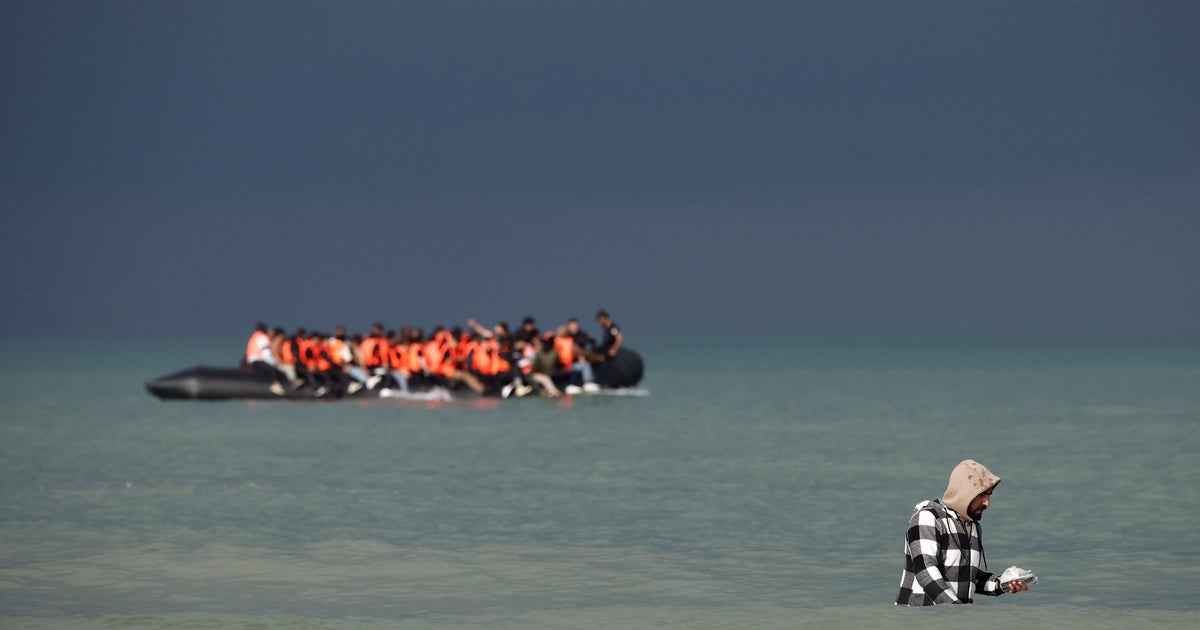
At least 8 dead in English Channel migrant crossing, French authorities say

Suspicious letters with unknown substance sent to election officials, feds say

3 U.S. citizens, 2 Spaniards held over alleged plot to "destabilize" Venezuela

Bodycam video shows arrest of apparent attempted assassination suspect
- Skip to main content
- Keyboard shortcuts for audio player
A pod of orcas has sunk a yacht in the Strait of Gibraltar
Ayana Archie

A pair of orcas swim off the west coast of Vancouver Island in 2018. Brian Gisborne/AP hide caption
A pair of orcas swim off the west coast of Vancouver Island in 2018.
For 45 minutes, the crew of the Grazie Mamma felt like they were under attack from below. A pod of orcas had zeroed in on the yacht's rudder as it made its way through the Strait of Gibraltar last week, and rammed it repeatedly, "causing major damage and leakage," according to the company that operated the boat.
Rescuers were able to save the crew and return them safely to port in Tanger-Med on the coast of Morocco. Their vessel, though, sank into the sea.
"This yacht was the most wonderful thing in maritime sailing for all of us," read a statement posted to Facebook by Morskie Mile , the Warsaw-based touring company that operated the boat. "Very good memories will be transferred to Grazie Mamma II. Love of the sea always wins and friendships remain with us."
The company said it is working to ensure its upcoming trips to the Canary Islands go on without a hitch.
Last week's incident was the latest in a string of recent "attacks" by orcas in the waters separating southern Europe and northern Africa — encounters that have left researchers scratching their heads.
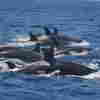
Killer whales are 'attacking' sailboats near Europe's coast. Scientists don't know why
Since 2020, there have been about 500 encounters between orcas and boats, Alfredo López Fernandez, a coauthor of a 2022 study in the journal Marine Mammal Science, told NPR earlier this year. At least three boats have sunk, though there is no record of an orca killing a human in the wild.
Scientists have been trying to pinpoint the cause of the behavior.
One theory among researchers is they're just playing around. Other researchers say it may be that the whales like the feel of the rudder.
"What we think is that they're asking to have the propeller in the face," said Renaud de Stephanis, president and coordinator at CIRCE Conservación Information and Research in Spain, in an interview with NPR last year. When they encounter a sailboat without its engine on, "they get kind of frustrated and that's why they break the rudder," de Stephanis said.
Another theory is that the behavior may be some sort of act of revenge due to possibly traumatic , previous encounters with fishing boats.

Revenge of the killer whales? Recent boat attacks might be driven by trauma
"I definitely think orcas are capable of complex emotions like revenge," Monika Wieland Shields, director of the Orca Behavior Institute previously told NPR. Shields said she does not think "we can completely rule it out," even if she was not entirely convinced herself.
Deborah Giles, the science and research director at conservation group Wild Orca, says pods in other areas, such as near Washington state, have been targeted by humans, but haven't shown a pattern of ramming boats.

How wildlife officials saved a humpback whale found 'hogtied' to a 300-pound crab pot
Which underscores why researchers say it's difficult to draw any conclusions from the interactions documented to date. In an open letter published this summer, 30 scientists cautioned against "projecting narratives onto these animals," writing that "In the absence of further evidence, people should not assume they understand the animals' motivations."
Correction Nov. 7, 2023
An earlier version of this story misstated the yacht's name, Grazie Mamma, as Grazie Mamma II.
- Share full article
Advertisement
Supported by
Orcas Sank 3 Boats in Southern Europe in the Last Year, Scientists Say
A small group of orcas is ramming into sailboats in waters off the Iberian Peninsula. Researchers say they do not know what is driving the unusual behavior toward boats.

By Isabella Kwai
Hours into a journey to Portugal from Morocco, the crew of a 46-foot sailing cruiser noticed something was wrong with the rudder. Then, someone shouted what they saw slicing through the choppy waves: “Orcas! Orcas!”
The orcas kept pace with the boat, slamming into its side and chewing at the rudder, according to its skipper, a photographer onboard and video of the encounter. For about an hour, the crew signaled their predicament to the Spanish Coast Guard and tried to stay calm.
“There was nothing we could do,” said Stephen Bidwell, the photographer, who was two days into a weeklong sailing course with his partner when the ramming began. “You’re in awe at the same time as you are nervous.”
The skipper, Gregory Blackburn, said he wrestled for control of the boat as the orcas banged into it, interfering with the rudder. “It’s a reminder of where we are in the food chain and the natural world,” he said.
Eventually the boat managed to motor back to Tangier, Morocco. But marine scientists took note of the episode, on May 2, and said it continued a puzzling pattern of behavior by a small group of orcas off the Iberian Peninsula’s western coast. The orcas, according to the researchers, have caused three boats to sink since last summer and disrupted the trips of dozens of others.
Wild orcas, although apex predators that hunt sharks and whales , are not generally considered dangerous to humans . The animals, the largest of the dolphin family , have been known to touch, bump and follow boats, but ramming them is unusual, marine scientists say. A small group of orcas, numbering about 15, started to batter boats around Spain in 2020, with researchers calling the behavior uncommon and its motivations unclear.
“We know that it is a complex behavior that has nothing to do with aggression,” said Alfredo López Fernandez, a biologist at the University of Aveiro in Portugal who worked on a study published last June on the subject. The orcas show no sign of wanting to hurt humans, he said.
In most sightings, the orcas do not change their behavior or make physical contact, according to the Atlantic Orca Working Group , which began tracking direct interactions — as well as sightings — in 2020.
Since an initial surge that year, orcas have been documented approaching or reacting to vessels about 500 times, causing physical damage about 20 percent of the time, in the high-trafficked seas near Morocco, Portugal and Spain, the group said.
The orcas off the Iberian coast are considered an endangered population : The group arrives in waters near the Strait of Gibraltar every spring from waters deeper and farther north up the coast to hunt tuna. But while they are a usual sight, scientists do not know how to stop the small group’s recent behavior, which has left sailors worried about safety and ship damage, and which has caught the attention of the Spanish and the Portuguese authorities.
“Every week there is an incident,” said Bruno Díaz López, a biologist and the director of the Bottlenose Dolphin Research Institute who was not involved in last year’s research. “We really don’t know the reason.”
In the most recent example, orcas battered a sailboat off the coast of Spain, causing it to sink in the early hours of May 5. The Spanish authorities quickly arrived, and the four people onboard were rescued “in good humor,” said Christoph Winterhalter, the president of the Swiss company that was operating the boat, Hoz Hochseezentrum International.
The University of Aveiro biologist, Dr. López Fernandez, said that it was possible that the three boats sank over the past year because they were vulnerable to leaks or not equipped to endure the damage. (“The condition of the boat was very good,” Mr. Winterhalter said of the one his company had chartered.)
The small group of orcas, including only two adults, were responsible for a majority of the interactions with boats, which number some 200 a year and range from the North African coast to France, according to Dr. López Fernandez.
Researchers do not know what is behind the behavior. Some have speculated that it is an “aversive behavior” that could have started after an incident between an animal and a boat, like an entanglement in fishing line, or an invented behavior from young orcas that is being repeated.
Those remain only theories, though Dr. López Fernandez said it appeared that the behavior might be passing between local animals.
“We know that orcas share their culture with their young and with their peers,” he said, adding that they learned from imitation. But because the behavior has been observed only in this particular subpopulation of orcas, he said that it was unlikely to pass onto distinct orca groups that populate waters around the world.
Given the lack of evidence and the presence of young orcas in the group, other scientists expressed skepticism that the behavior stemmed from a boat incident and believed that the animals may simply be playing.
“They’re getting some sort of reward or thrill from it,” said Erich Hoyt, an orca expert and research fellow with Whale and Dolphin Conservation, a wildlife charity. “Play is part of being a predator.”
Scientists say that aside from having sailors avoid the area, they do not know how to stop orcas from bothering sailboats, which tend to be quieter than most vessels and therefore more attractive to the animals.
It has also left conservationists worried about how humans will treat the orca population, especially as sailors in the region express growing frustration with the animals.
“I hope that they stop doing it as quickly as they started, because it’s actually imposing a risk on themselves,” said Hanne Strager, a marine biologist and the author of “ The Killer Whale Journals ,” adding that it was putting pressure on an already vulnerable species.
Mr. Bidwell, the photographer, said the episode would not stop him and his partner from booking another sailing trip in June, though perhaps with some changes. “Maybe we don’t go that same route,” he said.
Isabella Kwai is a breaking news reporter in the London bureau. She joined The Times in 2017 as part of the Australia bureau. More about Isabella Kwai
Around the World With The Times
Our reporters across the globe take you into the field..
China’s Risky Power Play: As China pushes to dominate the South China Sea, it is increasingly willing to use force to drive out the Philippines , a treaty ally of the United States, raising fears of a superpower showdown.
Endangering ‘Pura Vida’: Costa Rica’s lush rainforests were a tourist paradise. Now, they are being infiltrated by drug cartels on a quest to find new trafficking routes to evade the authorities.
Life in Kharkiv Endures: Despite constant Russian bombings, residents of the war-ravaged Ukrainian city have found outlets for joy and emotional release above and below ground .
Who Is ‘Ivan the Troll?’: A 3D-printed gun design co-created by a man who lives in Illinois has been linked to terrorists, drug dealers and freedom fighters in at least 15 countries. Read our investigation .
The Tram Driver Olympics: In Frankfurt, Europe’s public transit captains showed off their skills at an annual championship. The event might best be described as tram dressage .
Orcas again sink yacht near Strait of Gibraltar as high-risk season looms
Two people were rescued after orcas hit the roughly 50-foot Alboran Cognac 14 miles off the coast of Morocco, the 26th orca encounter in the region this year.

The boat-sinking orcas are back.
Around 9 a.m. Sunday near the Strait of Gibraltar, two people on board the roughly 50-foot Alboran Cognac reported blows to the vessel’s hull and saw damage to the rudder as water flowed into the ship, Spain’s maritime rescue agency said.
An unknown number of killer whales had struck again, after hundreds of such encounters in recent years.
Over the radio, responders told the two individuals to put on their life jackets, make sure their GPS locaters were turned on and prepare for emergency evacuation. In the meantime, Spanish and Moroccan rescue agencies began urgently working to save them, locating a nearby oil tanker and electing not to dispatch a helicopter.
After about an hour, that tanker rescued the pair 14 miles off Cape Spartel in northern Morocco, the Spanish Maritime Safety and Rescue Agency (SASEMAR) said in a news release. The boat was left adrift and soon sank.
Spain-based Alboran Charter confirmed its ownership of the sunken vessel and said the individuals were customers. The company declined to say more about what happened or who the clients were.
Iberian orcas sinking a ship is not new. Over the past four years, at least 15 orcas have interacted with hundreds of boats sailing in the waters off Portugal, Spain and Morocco, sinking a handful of vessels in seemingly coordinated ambushes. Some ships have been found with teeth marks; others appear to have been rammed by an orca’s head or body.
On average, there have been 168 interactions each year since 2020, according to Grupo de Trabajo Orca Atlántica, or GTOA, a research group studying the region’s killer whales. GTOA has tracked 26 interactions so far this year, down from 61 through a similar time frame in 2023.
It’s not clear why the orcas have recently bumped, bitten and sunk vessels. Some scientists say they are simply being playful, or maybe are curious, or perhaps are coming after boats because of a loss of prey. A handful say the actions could actually be gratifying to the whales.
A leading theory, though, is one of vengeance.
This idea, advanced by a scientist who has studied the encounters, posits that a female orca suffered a traumatic run-in with a boat that led her to start attacking the vessels. And because orcas are intelligent marine mammals that learn behaviors like hunting together, others followed.
But there is disagreement over this theory.
Some scientists argue that the incidents shouldn’t be called “attacks” without knowing the whales’ motives. They fear that label could prompt retaliation by boaters, calling it potentially “harmful” to the critically endangered species with just a few dozen members.
“Science cannot yet explain why the Iberian orcas are doing this, although we repeat that it is more likely related to play/socialising than aggression,” a group of more than 30 scientists wrote in an open letter last summer. “ … When we are at sea, we are in the realm of marine life. We should not punish wildlife for being wild.”
The letter explained that orcas have been observed developing “cultural ‘fads,’” including carrying dead fish on their heads, and the incidents with the boats may be nothing more than a “fashion trend.”
SASEMAR warned that the risk of the encounters is highest between May and August, recommending that boats avoid the area between the Strait of Gibraltar to the Gulf of Cádiz to its west. It added that if a boat comes across orcas, it should not stop moving, and instead should head toward the coast and shallower waters. People should not approach the side of the boat and are barred from using measures that could injure or kill the whales.
“It is possible the behaviour, as previous fads have,” the scientists wrote, “will disappear as suddenly as it appeared.”

672 Wine Club
- Motorcycles
- Car of the Month
- Destinations
- Men’s Fashion
- Watch Collector
- Art & Collectibles
- Vacation Homes
- Celebrity Homes
- New Construction
- Home Design
- Electronics
- Fine Dining
- Benchmark Wines
- Brian Fox Art
- Disneyland Resort
- Ka La’I Wakiki Beach
- Kalamazoo Grill
- Raffles Hotels & Resorts
- Sports & Leisure
- Health & Wellness
- Best of the Best
- The Ultimate Gift Guide
Killer Whales Sunk a 50-Foot Sailing Yacht in the Strait of Gibraltar
It's just the latest in a string of orca attacks on sailboats., tori latham, tori latham's most recent stories, the shipyard that built the ‘titanic’ has filed for bankruptcy.
- Inside MXO, the Mexican Steakhouse From a Pioneer of L.A.’s Taco Scene
- Con Air? The U.S. Launches Investigation Into 4 Major Airline Loyalty Programs
- Share This Article

Two sailors had a whale of a time over the weekend—but only in the technical sense.
Related Stories
- This Bonkers Space Balloon Just Completed Its First Full Test Flight
- This New Superyacht Line Wants You to Feel Like You’re Cruising in a Sports Car
“This was a scary moment,” the skipper Jelmer van Beek said at the time. “Three orcas came straight at us and started hitting the rudders. Impressive to see the orcas, beautiful animals, but also a dangerous moment for us as a team.”

While that attack didn’t result in the sinking of the ship, another sailing yacht sank near the Tanger Med port in November, The New York Times wrote. The crew of that ship had to abandon the boat after a group of orcas slammed into the rudder for a whole 45 minutes. (The whales have seemingly been targeting sailboats in particular.)
Researchers don’t know for sure why the whales have been attacking boats, but they think it may be one of the ways the orcas play, the Times said—a pretty dangerous form of amusement, albeit. Others have theorized that it’s a short-term fad among the animals, or that one orca experienced a traumatic event that made it aggressive and other whales began to mimic that behavior. The incidents have become so common in recent years that sailors trade advice online about how to maneuver in the Strait of Gibraltar area, and the Spanish government issued a release that included tips for sailors.
Tori Latham is a digital staff writer at Robb Report. She was previously a copy editor at The Atlantic, and has written for publications including The Cut and The Hollywood Reporter. When not…
Read More On:
- Sailing Yacht
More Marine

This New Catamaran Concept Was Designed to Carry Your Bugatti Across the High Seas

Meet Spitfire, a New 164-Foot Superyacht Based on a High-Performance Patrol Boat

What It’s Like to Watch an America’s Cup Race Right on the Water

Meet the Wine Club That Thinks Differently.
Receive editor-curated reds from boutique California producers four times a year.
Give the Gift of Luxury
Latest Galleries in Marine

Tribale 120 Gran Turismo in Photos

Spitfire Superyacht in Photos
More from our brands, chloë sevigny exudes edginess in phoebe philo bomber jacket at the ‘monsters: the lyle and erik menendez story’ los angeles premiere, tennessee to add ticket ‘talent fee’ for athlete revenue-sharing, kacey musgraves’ new reformation collection is ‘made for frolicking’: ‘designing every little detail was such a joy’, chart director julie quottrup silbermann on bucking the traditional art fair format, trashing booths, and being nonprofit, the best yoga mats for any practice, according to instructors.
UK Edition Change
- UK Politics
- News Videos
- Paris 2024 Olympics
- Rugby Union
- Sport Videos
- John Rentoul
- Mary Dejevsky
- Andrew Grice
- Sean O’Grady
- Photography
- Theatre & Dance
- Culture Videos
- Fitness & Wellbeing
- Food & Drink
- Health & Families
- Royal Family
- Electric Vehicles
- Car Insurance Deals
- Lifestyle Videos
- Hotel Reviews
- News & Advice
- Simon Calder
- Australia & New Zealand
- South America
- C. America & Caribbean
- Middle East
- Politics Explained
- News Analysis
- Today’s Edition
- Home & Garden
- Broadband deals
- Fashion & Beauty
- Travel & Outdoors
- Sports & Fitness
- Climate 100
- Sustainable Living
- Climate Videos
- Solar Panels
- Behind The Headlines
- On The Ground
- Decomplicated
- You Ask The Questions
- Binge Watch
- Travel Smart
- Watch on your TV
- Crosswords & Puzzles
- Most Commented
- Newsletters
- Ask Me Anything
- Virtual Events
- Wine Offers
- Betting Sites
Thank you for registering
Please refresh the page or navigate to another page on the site to be automatically logged in Please refresh your browser to be logged in
Orcas sink another yacht in relentless 45-minute attack
Pod of killer whales scuppered vessel in strait of gibraltar despite best efforts of search and rescue teams and the moroccan navy, article bookmarked.
Find your bookmarks in your Independent Premium section, under my profile


Sign up to the Independent Climate email for the latest advice on saving the planet
Get our free climate email, thanks for signing up to the independent climate email.
Killer whales have sunk yet another boat in southwestern Europe , marking the fourth such incident in the region in the last two years.
The latest attack saw a pod of orcas target a yacht in the Strait of Gibraltar for about 45 minutes, Polish cruise company Morskie Mile said in a Facebook post on 31 October.
The boat’s operator said the relentless attack focused on the yacht’s steering fin and caused extensive damage and leakage.
“Despite attempts to bring the yacht to the port by the captain, crew and rescuers from the SAR (Search and Rescue), port tugs and the Moroccan Navy, the unit sunk near the entrance to the port of Tanger Med,” the company said, while adding that the crew was “safe, unharmed, and sound”.
The attack is the latest reported case of killer whales targetting boats in Gibraltar – a phenomenon that has intrigued animal behaviour scientists.
Cases of orcas harassing boats passing by in the Strait of Gibraltar, which runs between Spain and Morocco and connects the Atlantic Ocean to the Mediterranean Sea, began being reported in 2020.
The strange behaviour has perplexed scientists, with some theorising that the killer whales may be teaching each other to attack boats passing by in the region.
Researchers have floated a number of theories to explain the behaviour of the aquatic mammals.
These explanations range from food scarcity and the disruptive resumption of post-pandemic nautical activities to playful interactions.
There have been documented cases of “play behaviour” among different orca populations as some killer whales in previous studies were shown to “harass” porpoises .
Researchers suspect these were likely orchestrated by orcas as a form of social play to bond, communicate or simply for fun among themselves, and that the behaviour would provide benefits such as improved group coordination and teamwork.
But scientists have also begun to investigate whether the Gibraltar attacks are linked to past trauma.
Whatever the orcas’ motivation, such incidents have highlighted the more widespread concerns of scientists around the impact of human nautical activity on intelligent marine mammals .
Join our commenting forum
Join thought-provoking conversations, follow other Independent readers and see their replies
Subscribe to Independent Premium to bookmark this article
Want to bookmark your favourite articles and stories to read or reference later? Start your Independent Premium subscription today.
New to The Independent?
Or if you would prefer:
Hi {{indy.fullName}}
- My Independent Premium
- Account details
- Help centre
Orcas have sunk 3 boats in Europe and appear to be teaching others to do the same. But why?
Scientists think a traumatized orca initiated the assault on boats after a "critical moment of agony" and that the behavior is spreading among the population through social learning.
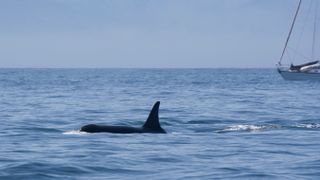
Orcas have attacked and sunk a third boat off the Iberian coast of Europe, and experts now believe the behavior is being copied by the rest of the population.
Three orcas ( Orcinus orca ), also known as killer whales, struck the yacht on the night of May 4 in the Strait of Gibraltar, off the coast of Spain, and pierced the rudder. "There were two smaller and one larger orca," skipper Werner Schaufelberger told the German publication Yacht . "The little ones shook the rudder at the back while the big one repeatedly backed up and rammed the ship with full force from the side."
Schaufelberger said he saw the smaller orcas imitate the larger one. "The two little orcas observed the bigger one's technique and, with a slight run-up, they too slammed into the boat." Spanish coast guards rescued the crew and towed the boat to Barbate, but it sank at the port entrance.
Two days earlier, a pod of six orcas assailed another sailboat navigating the strait. Greg Blackburn, who was aboard the vessel, looked on as a mother orca appeared to teach her calf how to charge into the rudder. "It was definitely some form of education, teaching going on," Blackburn told 9news .
Reports of aggressive encounters with orcas off the Iberian coast began in May 2020 and are becoming more frequent, according to a study published June 2022 in the journal Marine Mammal Science . Assaults seem to be mainly directed at sailing boats and follow a clear pattern, with orcas approaching from the stern to strike the rudder, then losing interest once they have successfully stopped the boat.
"The reports of interactions have been continuous since 2020 in places where orcas are found, either in Galicia or in the Strait," said co-author Alfredo López Fernandez , a biologist at the University of Aveiro in Portugal and representative of the Grupo de Trabajo Orca Atlántica, or Atlantic Orca Working Group.
Related: Grisly new footage shows orcas attacking a great white shark and eating its liver
Sign up for the Live Science daily newsletter now
Get the world’s most fascinating discoveries delivered straight to your inbox.
Most encounters have been harmless, López Fernandez told Live Science in an email. "In more than 500 interaction events recorded since 2020 there are three sunken ships. We estimate that killer whales only touch one ship out of every hundred that sail through a location."
The spike in aggression towards boats is a recent phenomenon, López Fernandez said. Researchers think that a traumatic event may have triggered a change in the behavior of one orca, which the rest of the population has learned to imitate.
"The orcas are doing this on purpose, of course, we don't know the origin or the motivation, but defensive behavior based on trauma, as the origin of all this, gains more strength for us every day," López Fernandez said.
Experts suspect that a female orca they call White Gladis suffered a "critical moment of agony" — a collision with a boat or entrapment during illegal fishing — that flipped a behavioral switch. "That traumatized orca is the one that started this behavior of physical contact with the boat," López Fernandez said.
Orcas are social creatures that can easily learn and reproduce behaviors performed by others, according to the 2022 study. In the majority of reported cases , orcas have made a beeline for a boat's rudder and either bitten, bent or broken it.
"We do not interpret that the orcas are teaching the young, although the behavior has spread to the young vertically, simply by imitation, and later horizontally among them, because they consider it something important in their lives," López Fernandez said.
— 2 orcas slaughter 19 sharks in a single day in South Africa, eating their livers and leaving them to rot
— Orca males are burnouts who let their moms do all the hunting, surprising study finds
— Orcas and humpbacks clash in a violent melee of breaching and biting
Orcas appear to perceive the behavior as advantageous, despite the risk they run by slamming into moving boat structures, López Fernandez added. Since the abnormal interactions began in 2020, four orcas belonging to a subpopulation living in Iberian waters have died, although their deaths cannot be directly linked to encounters with boats.
The unusual behavior could also be playful or what researchers call a "fad" — a behavior initiated by one or two individuals and temporarily picked up by others before it’s abandoned. "They are incredibly curious and playful animals and so this might be more of a play thing as opposed to an aggressive thing," Deborah Giles , an orca researcher at the University of Washington and at the non-profit Wild Orca, told Live Science.
As the number of incidents grows, there is increased concern both for sailors and for the Iberian orca subpopulation, which is listed as critically endangered by the IUCN Red List . The last census, in 2011, recorded just 39 Iberian orcas, according to the 2022 study. "If this situation continues or intensifies, it could become a real concern for the mariners' safety and a conservation issue for this endangered subpopulation of killer whales," the researchers wrote.
Sascha is a U.K.-based trainee staff writer at Live Science. She holds a bachelor’s degree in biology from the University of Southampton in England and a master’s degree in science communication from Imperial College London. Her work has appeared in The Guardian and the health website Zoe. Besides writing, she enjoys playing tennis, bread-making and browsing second-hand shops for hidden gems.
Boat-ramming orcas may be using yachts as target practice toys, scientists suggest
2 young orcas ram sailboat off northern France — 800 miles from 'attack' hotspot
The bubbling surface of a distant star was captured on video for the 1st time ever
Most Popular
- 2 Ocean Photographer of the Year 2024: See stunning photos of hungry whale, surfing seagull, freaky fish babies, land-loving eel and adorable toxic octopus
- 3 NASA's Voyager 1 probe swaps thrusters in tricky fix as it flies through interstellar space
- 4 Earth from space: Ghostly figure emerges in Greenland ice after underground lake collapses
- 5 The James Webb telescope has brought cosmology to a tipping point. Will it soon reveal new physics?
Why are orcas attacking boats and sometimes sinking them?

After four years and hundreds of incidents, researchers remain puzzled why orcas, also known as killer whales, continue to ram boats – sinking a few of them – along the Iberian Peninsula. The most-recent incident was the sinking of a yacht on Oct. 31 in the Strait of Gibraltar.
The origin of these interactions remain a "great mystery," said Alfredo López, a University of Santiago biologist, but he does not believe the behavior is aggressive. Orcas are large dolphins, López said. And like dolphins, the events could stem from the orcas’ curious and playful behavior, such as trying to race the boats.
López, who specializes in orcas, and his team, Grupo de trabajo Orca Atlántica (GOTA) , have tracked these encounters since 2020. The team’s recent study theorizes the orcas could also be exhibiting cautionary behavior because of some previous traumatic incident.
Where have killer whales interacted with boats?
GOTA has tracked more than 350 interactions just on the Iberian Peninsula since 2020. Most have taken place along the Strait of Gibraltar, but the orcas’ mischief or self-defense may be spreading north. An incident was reported in June in the Shetland Islands in Scotland .
GOTA defines interactions as instances when orcas react to the presence of approaching boats, such as:
- Interaction without physical contact.
- Some physical contact without damage.
- Contact that causes serious damage that could prevent the navigation of the boat.
Recent incidents when orcas attacked boats and sank them
The Oct. 31 incident occurred in the Strait of Gibraltar where a pod of orcas sank a mid-size sailing yacht named the Grazie Mamma after a 45-minute interaction, Live Science reported .
On June 19 an orca rammed a 7-ton yacht multiple times off the Shetland Islands in Scotland, according to an account from retired Dutch physicist Dr. Wim Rutten in the Guardian.
"Killer whales are capable of traveling large distances, so it is not out of the ordinary that an animal could travel that far," said Tara Stevens, a marine scientist at CSA Ocean Sciences Inc. "To my knowledge, this data is not available, so we cannot confirm at this time if these are the same animals."
Including the Oct. 31 incident, orcas have sunk four boats this year. The previous sinking occured in May , off the coasts of Portugal and Spain, but whale expert Anne Gordon told USA TODAY in May that the incidents shouldn't heighten concerns about the whales.
"Yes, they're killer whales. And yes, their job is to be predators in the ocean, but in normal circumstances there is absolutely zero threat to humans in a boat," Gordon said .
Most of the interactions have involved sailboats, but fishing boats, semi-rigid boats and motorboats haven’t gone unscathed.
Are these the same killer whales attacking boats or unrelated incidents?
López hypothesizes that the interactions could be a self-induced behavior where you're "inventing something new and repeat it. This behavior coincides with the profile of the juveniles." He said it could also be response to an aversive situation: "One or several individuals had lived a bad experience and tried to stop the boat so as not to repeat it. This behavior coincides with the profile of adults."
"Fifteen different orcas from at least three different communities" have been identified, López said. And they are probably teaching the habit to others, or the others are mimicking the behavior. "Without a doubt orcas learn by imitation," López said. The majority of the culprits are juveniles that touch, push and sometimes turn the vessels. He noted that adult males don't appear to be involved.
"Killer whales are incredibly intelligent animals that do learn behaviors from observation of other individuals," Stevens said. "Typically, very unique behaviors such as this are learned 'within' group, meaning individuals of the group may learn from each other and participate, but that does not necessarily mean that the behavior is shared outside the group with other individuals."
Which pods of killer whales are battering the boats?
Orcas operate in a social structure called a pod. These pods generally are a group of several generations of related orcas. Hierarchies are established within them, and they communicate and learn from one another, the study reads.
GOTA researchers have identified the individuals responsible for the interactions . One large pod is made up of three generations. It starts with grandmother Gladis Lamari, her daughter, grandchildren and a few other relatives.
Another pod comprises siblings Gladis Negra and Gladis Peque. Both have been photographed interacting with boats. Their mother, Gladis Herbille, has generally just watched her children at a distance from the boats, the study said.
A third group in the study are siblings and a cousin.
Orcas often tracking bluefin tuna
The movements of orcas depend on the location of their main food source, bluefin tuna. The migratory movements of tuna are very dynamic and predicting exactly where interactions will take place is very difficult, the report said. According to NOAA , Atlantic bluefin tuna are the largest in the tuna family and can reach a length of 13 feet and up to 2,000 pounds. They are a highly migratory species and can migrate thousands of miles across an entire ocean.
About the Iberian orcas
While they are called killer whales, orcas are actually the largest member of the dolphin family. This aquatic marine mammal family includes whales, dolphins and porpoises.
The Iberian orca is a subpopulation of the Atlantic orca population. These orcas are from the Strait of Gibraltar and the Gulf of Cádiz. Iberian orcas are small: 16 to 21 feet compared with Atlantic orcas that measure almost 30 feet.
Orcas in general are fast, reaching speeds up to 27.6 mph. By comparison, a 39-foot sailboat travels at about 9.2 mph.
What should you do if your boat is attacked by killer whales
The study recommended these tips to reduce the duration and intensity of the interaction.
- Stop the boat.
- Leave the rudder loose.
- Radio for help.
According to the GOTA study, most of the vessels involved in interactions are medium-sized (less than 49 feet) sailboats, with a paddle rudder, sailing at an average of 6.9 mph, under both sail and motor.
The interactions have been mostly concentrated in the spring and summer months and have been concentrated in the midday hours. They've lasted on average for 40 minutes, but several last less than 30 minutes.
Types of rudders Iberian orcas have approached
"It is very common for dolphins to interact with the boats and approach," López said. "Before 2020, the orcas did it with frequency but they weren't classified as attacks. Now, sometimes they touch the boat and the encounter is unfairly classified as an attack. They judge socially before understanding what (orcas) do."
Orcas have sunk another vessel off the European coast. Why won't they stop ramming boats?
By Audrey Courty
Topic: Whales
A group of three orcas repeatedly hit the rudder of a race boat in June 2023. ( Supplied: The Ocean Race )
The orcas are at it again: for the seventh time in four years, a pod of whales has sunk a boat after ramming it in Moroccan waters off the Strait of Gibraltar.
The 15 metre-long yacht Alborán Cognac, which carried two people, encountered the highly social apex predators at 9am local time on Sunday, Spain's maritime rescue service said.
The passengers reported feeling sudden blows to the hull and rudder before water started to seep into the sailboat. It is not known how many orcas were involved.
After alerting rescue services, a nearby oil tanker took them onboard and carried them to Gibraltar, a British overseas territory on Spain's southern coast.
Nothing could be done to save the sailboat, which drifted and eventually sank.
It's the latest incident in what has become a trend of hundreds of interactions between orcas and boats since the "disruptive behaviour" was first reported in the region in May 2020.
The origin of this new behaviour has baffled scientists, though the leading theory suggests this "social fad" began as a playful manifestation of the whales' curiosity.
Where have orcas interacted with boats?
The latest data from the Atlantic Orca Working Group (GTOA), an organisation that contributes to the animals' conservation and management, shows that there have been at least 673 interactions since 2020.
GTOA defines interactions as instances when orcas react to the presence of approaching boats with or without physical contact.
The map below shows the highest numbers of encounters from April to May 2024 took place off Spain's southern coast in the Strait of Gibraltar (red zones), with some lesser activity in surrounding areas (yellow zones).
The majority of reported encounters with orcas in April and May 2024 took place around the Strait of Gibraltar, between Spain and Morocco. ( Supplied: GTOA )
A 2022 peer-reviewed study published in the Marine Mammal Science journal found the orcas in these areas preferred interacting with sailboats — both monohulls (72 per cent) and catamarans (14 per cent) — with an average length of 12 metres.
A clear pattern emerged of orcas striking their rudders, while sometimes also scraping the hulls with their teeth. Such attacks often snapped the rudder, leaving the boat unable to navigate.
"The animals bumped, pushed and turned the boats," the authors of the report said.
Adding this week's encounter, there have been seven reported cases of orcas damaging a boat so badly that it has sunk, though the people onboard were rescued safely each time.
In June 2023, a run-in with the giant mammals in the Strait of Gibraltar forced the crew competing in The Ocean Race to drop its sails and raise a clatter in an attempt to scare the approaching orcas off.
No-one was injured, but Team JAJO skipper Jelmer van Beek said that it had been a "scary moment".
"Three orcas came straight at us and started hitting the rudders," he said.
"Impressive to see the orcas, beautiful animals, but also a dangerous moment for us as a team ... Luckily, after a few attacks, they went away."
After analysing 179 videos and photos of these types of interactions, which lasted on average 40 minutes, researchers concluded there was no reason to classify the events as intentionally hostile behaviour.
"The behaviour of orcas when interacting with boats is not identified as aggressive," they said.
"One of their main motivations has been identified as competition with boats for speed."
Still, the researchers of the study admitted they were not sure what triggered the novel behaviour in 2020.
"We are not yet certain what the origin of these interactions is, but it is still suspected that it could be a curious and playful behaviour," they wrote.
"[The behaviour] could be self-induced, or on the other hand it could be a behaviour induced by an aversive incident and therefore a precautionary behaviour."
Are the same orcas responsible for these incidents?
Out of around 49 orcas living in the Strait of Gibraltar, GTOA researchers found a total of 15 whales from at least three different communities participated in the unusual interactions with boats between 2020 and 2022.
Most of those that engaged with greater intensity were juveniles, though it's unclear if others have since joined the group.
These giant mammals, which belong to the dolphin family, can measure up to eight metres and weigh up to six tonnes as adults.
The director of the Orca Behaviour Institute, Monika Wieland Shields, has said there is no evidence to prove the theory these whales were seeking vengeance against humans for a past trauma.
"While I'm sure it feels like an attack for the people on board, for the whales themselves, it really looks more like play behaviour," she said.
"There's something intriguing or entertaining to them about this [boat rudder] mechanism and they're just showing a lot of curiosity about it."
Ms Wieland said it's likely this new behaviour spread through the population as a kind of "social fad".
"Orcas are highly intelligent, very social animals, and with that comes a tendency to be curious about and explore your environment," she said.
"One thing that we see are these kind of fad behaviours that will appear in a certain population.
"One whale discovers something, they find it entertaining or interesting, or fun — it's some type of game. And then they will teach that to other members of their family group."
Are orcas dangerous to humans?
While orcas have earned their fearsome reputation for preying on other marine animals, there is no record of them killing humans in the wild.
In captivity, orcas have killed four people since the 1990s, though it's unclear whether the deaths were accidental or deliberate attempts to cause harm.
Ms Shields said she was worried the recent interactions between orcas and boats would skew people's perceptions of these mammals.
"I am concerned that people are going to react with fear, potentially injure or shoot at some of these whales," Ms Shields said.
"We really need to educate boaters about the best things that they can do to make themselves less attractive to the whales and the best case scenario would be the whales lose interest in this and move onto something less destructive."
Spain's Transport Ministry advises that whenever boats observe any changes in the behaviour of orcas — such as in their direction or speed — they should leave the area as soon as possible and avoid further disturbance to the animals.
The ministry also states every interaction between a ship and an orca must be reported to authorities.
Why are killer whale attacks on the rise? These scientists set sail to find out
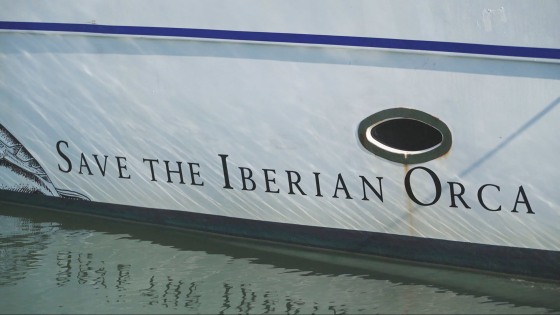
ABOARD A BOAT IN THE STRAIT OF GIBRALTAR — From the surface, the azure waters seem calm and inviting in this narrow patch where the Atlantic Ocean meets the Mediterranean Sea .
Spain’s arid coast looms in one direction; the tip of Africa in another, less than 10 miles away. From time to time, schools of small fish breach the water in unison, as if in symphony.
But with binoculars trained on the horizon, the boat’s captain is on the lookout for something potentially far more unsettling: orcas, also known as killer whales, who in recent years have taken to slamming boats with alarming regularity.
Over the last five years, roughly 700 orca run-ins have been recorded, according to the Atlantic Orca Working Group-GTOA, a partnership of Spanish and Portuguese scientists that monitors the Iberian killer whale population. At least a half-dozen yachts, fishing vessels and sailboats have sunk.
For the Spanish fisherman who take to the Strait of Gibraltar nightly hunting for tuna, marlin and swordfish, the likelihood of an orca run-in has added another harrowing element to an already dangerous job.
“Of course they can sink you,” fisherman Manuel Merianda told NBC News earlier this month as he plucked out errant stingrays trapped in his fishing net after harvesting the night’s catch. “They break your rudder and water and waves begin to enter your boat, and once the water enters there is nothing you can do.”
On one of his recent fishing trips, Merianda’s boat was followed by a pod of orcas, an experience he described as terrifying. Yet when asked if that risk made orcas his enemy, Merianda shook his head.
“We are the ones who are in their habitat,” he said in Spanish. “We are the ones who don’t have to be there.”
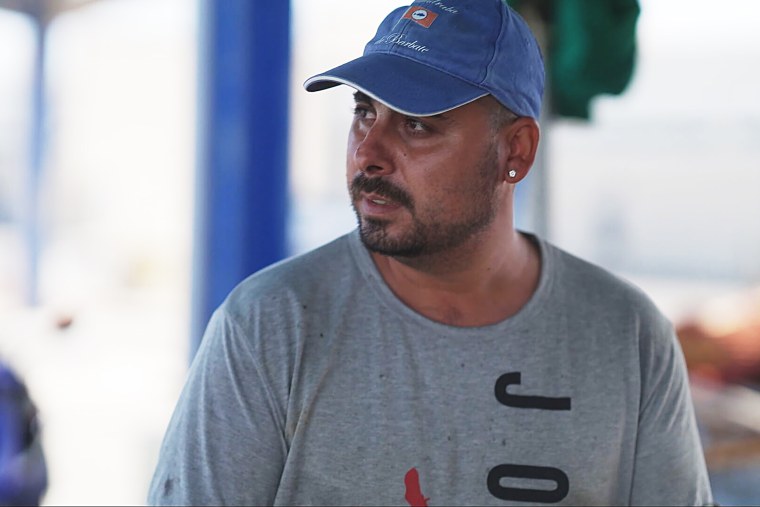
The encounters have nonetheless become so frequent that Spanish authorities have issued an alert, urging sailors to stay close to the coastline, where the orcas don’t tend to stray, especially during the summer months.
Often the creatures will ram into the rudders, potentially rendering the vessels inoperable, or even bite off pieces of the boats.
Why Iberian orcas are attacking ships in the Strait of Gibraltar, one of the world’s busiest waterways, has quickly become one of the terrifying mysteries of the sea. The highly intelligent animals are known to be generally peaceful, especially toward humans, and before 2020, such interactions were basically unheard-of.
Not everyone believes these events, while harrowing and dangerous, constitute “attacks” in the literal sense of the word.
“Attacking implies something aggressive towards humans,” said Janek Andre, whose organization WeWhale tries to protect orcas. “These orcas are simply playing. So in the end, we call it — and everybody should call it — an interaction.”
Nearly every day during summer months, Andre and his teammates board a small boat on the Spanish coast and sail into the strait to track the movement of the orcas. When they spot them, they radio their location to sailors in the area, encouraging them to stay away.
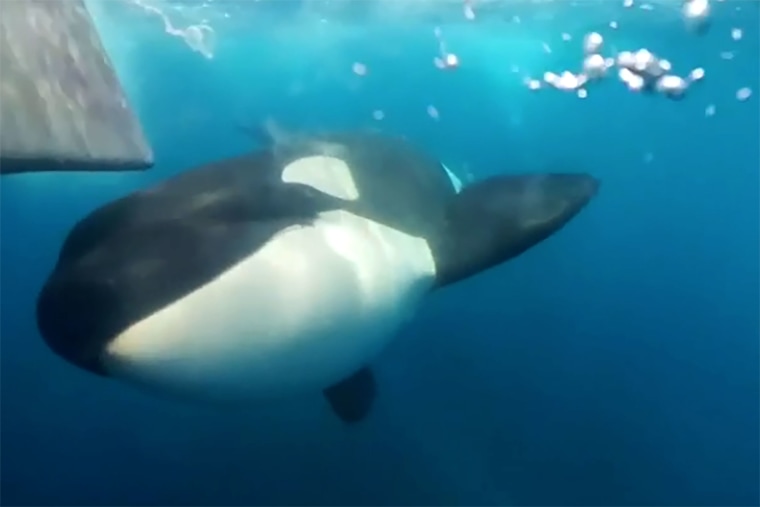
Marine biologists have a host of competing theories for what the orcas are doing, from the “play” theory championed by Andre to the notion the orcas are retaliating, either for damage that boats have done to orcas in the past or for human-caused pollution of the waters they rely on.
One theory holds that it may just be a fad — that the orcas, like popularity-chasing teenagers, have simply picked up a curious learned behavior that for whatever reason has become the trend of the moment.
But new research offers a competing theory that’s gained traction among those who study the orcas’ habitat.
Scientists from the Bottlenose Dolphin Research Institute, based on Spain’s northwest coast, have pointed out that in recent years, the once-dwindling population of Atlantic bluefin tuna has recovered, in the process becoming the linchpin of the orcas’ diet. Atlantic bluefin tuna are tough prey: They swim faster than orcas and grow up to 13 feet long.
In a paper published this month in the scientific journal Ocean and Coastal Management, the scientists argue that what humans see as attacks are actually older orcas training the younger ones on hunting methods needed to successfully overcome their prey.
“They need to ram, they need to hit, they need to bite, to isolate this large tuna. And then this has to be in cooperation,” Bruno Diaz Lopez, the institute’s founder and chief biologist, said in an interview. “So how do they reinforce this technique? Practicing.”
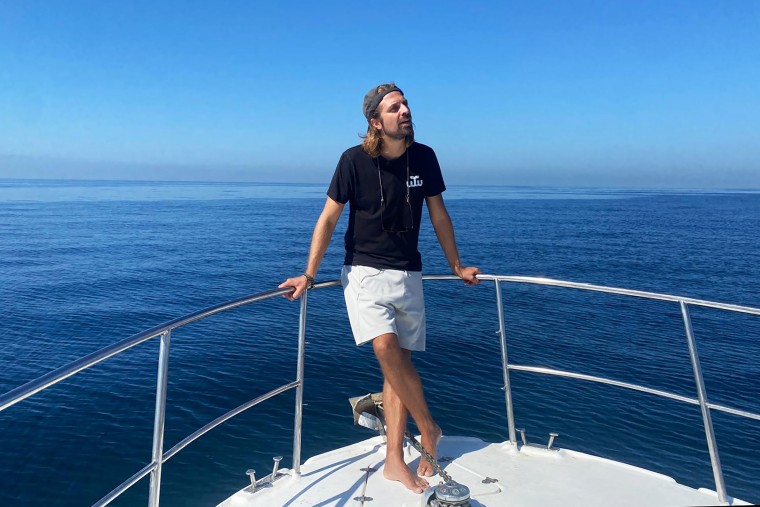
Orcas, or “killer whales,” can grow up to 27 feet long and weigh as much as six tons. Known as the ocean’s top predator, they’re extremely intelligent, with their own languages of clicks and whistles that differ from region to region.
The subspecies striking boats is called the Iberian orca, and its future is anything but certain. The creatures are on the International Union for Conservation of Nature’s “Red List” of critically endangered species. Only about 35 of them are still believed to be alive, and their reproductive rates have become alarmingly low.
Faced with the need to share the waters with gigantic mammals, sailors in the strait have tried various ways to deter orcas when they show up. Some make noise to try to scare them away, throw sand in the water, or push their motors to full speed and try to leave the area. Others advocate turning off the engine, keeping silent and playing dead.
As he plotted a course through rippling waters back toward the coast of Spain, Andre, the WeWhale founder, said he believed humans would never know with certainty why so many orca interactions are taking place.
“We are not orcas. So you can do a lot of science and studies,” Andre said. “But in the end, it’s such an unknown world for us, what’s happening below the water and how these animals actually interact.”
Josh Lederman is an NBC News correspondent.
Michael Fiorentino is an associate producer at NBC News Engel Unit based in London.
Who was on superyacht that sank off Sicily?
Twenty-two people were on board the Bayesian superyacht including British technology tycoon Mike Lynch, his wife and 18-year-old daughter, and Morgan Stanley International boss Jonathan Bloomer.
Friday 23 August 2024 12:34, UK

Details have emerged of the 22 people who were on board the superyacht that sank off the coast of Sicily.
The British-flagged vessel named Bayesian was carrying 12 passengers and 10 members of crew when it got into difficulty in the early hours of Monday.
Seven bodies have now been recovered. The other 15 people on board were rescued.
Here's what we know about those who were on the yacht.
Follow latest updates on the superyacht sinking

British technology tycoon Mike Lynch was among the original six people missing. On Thursday, divers confirmed his body had been recovered.
Raised in Ilford, east London by Irish parents, the 59-year-old made millions with the software company Autonomy he set up in 1996.
He had an estimated net worth of £852m, according to the 2023 Sunday Times Rich List, and is believed to have owned the yacht.
Off the back of Automomy's global success, Mr Lynch was given the roles of science adviser to former prime minister David Cameron and non-executive director of the BBC.
The Cambridge maths and sciences graduate sold the firm for £8.64bn to US giant Hewlett Packard (HP) in 2011.
Dubbed the "British Bill Gates", Mr Lynch has been in the headlines in recent months over a high-profile fraud case related to the sale of Autonomy to HP in 2011.
HP accused him of deliberately overstating the value of the company before it was acquired by the American technology firm. Mr Lynch denied any wrongdoing.
In June, a US jury cleared him of all charges .
Read more: Lynch's co-defendant dies days before yacht disaster
Hannah Lynch

Mr Lynch's 18-year-old daughter Hannah Lynch was also on board. A body believed to be that of the teenager was recovered on Friday from the yacht wreckage.
She had been on holiday with her parents, having secured a place to study English at the University of Oxford, according to reports.
Her former school, Latymer Upper School in Hammersmith, west London, said they were "incredibly shocked by the news that Hannah and her father are among those missing in this tragic accident" when the yacht first sank.
Angela Bacares
Mr Lynch's wife Angela Bacares was on board the yacht and was rescued.
The 57-year-old said she and Mr Lynch were awoken by the boat "tilting" at 4am - half an hour before it sank.
Jonathan Bloomer

Jonathan Bloomer, the chairman of investment bank Morgan Stanley International, was confirmed dead on Thursday.
According to the Financial Times, Mr Bloomer appeared as a defence witness for Mr Lynch during his US criminal trial and the pair were good friends. He also chaired Autonomy's audit committee.
The 70-year-old was the chief executive of UK-Hong Kong insurer Prudential until he was ousted by the board in 2005.
He was also chairman of the insurance provider Hiscox.
Judy Bloomer
Mr Bloomer's wife Judy was on the yacht trip with her husband. Divers confirmed they found her body on Thursday.
Mrs Bloomer was a former board member at The Eve Appeal charity, which focuses on gynaecological cancers.
The charity described her as a "brilliant champion for women's health and medical research... an incredible supporter, committee member, and trustee of our charity for over 20 years".
Read more: 'Alarming' potential cause of superyacht disaster What we know about superyacht that sank
Recaldo Thomas

The yacht's on-board chef Recaldo Thomas died in the sinking.
He was Canadian-Antiguan and part of the crew of the Bayesian.
His body was the first to be recovered from the wreckage.
Chris Morvillo

US lawyer Chris Morvillo was among those divers found dead on Thursday.
The father-of-two worked on Mr Lynch's US fraud trial and was a partner of law firm Clifford Chance's US branch.
Mr Morvillo was assistant attorney for the Southern District of New York between 1995 and 2005 and worked on the terrorist investigation into the 9/11 attacks.
In a recent LinkedIn post, he thanked the legal team that helped win Mr Lynch's trial.
Signing off the post, he said: "And, finally, a huge thank you to my patient and incredible wife, Neda Morvillo, and my two strong, brilliant, and beautiful daughters, Sabrina Morvillo and Sophia Morvillo.
"None of this would have been possible without your love and support. I am so glad to be home. And they all lived happily ever after…."
Neda Morvillo

Mr Morvillo's wife Neda died in the disaster alongside her husband.
The 57-year-old had a luxury jewellery brand, which she ran under her maiden name Neda Nassiri.

Keep up with all the latest news from the UK and around the world by following Sky News
Ayla Ronald

Ayla Ronald, a senior associate at Clifford Chance, survived the yacht disaster, the law firm confirmed.
The 36-year-old worked alongside Chris Morvillo in helping defend Mike Lynch in court.
Clifford Chance said in a statement: "Our utmost priority is providing support to the family as well as our colleague Ayla Ronald, who together with her partner, thankfully survived the incident."
She is originally from Christchurch, New Zealand, but lives in London, her father told local media there.
He said she was left "very shaken" but "she and her partner are alive".
Charlotte Golunski

Charlotte Golunski was on board the yacht and was rescued along with her one-year-old daughter, Sofia.
She spoke to Italian newspaper La Repubblica, confirming she survived the yacht sinking and told how she kept her daughter alive after she was rescued.
"I held her afloat with all my strength, my arms stretched upwards to keep her from drowning," she said.
"It was all dark. In the water I couldn't keep my eyes open. I screamed for help but all I could hear around me was the screams of others."
The 35-year-old is a partner at one of Mr Lynch's firms - Invoke Capital - and has worked there since 2012, according to her LinkedIn profile.
She also worked at Hewlett Packard, which acquired Autonomy in 2011, for 11 months.
Before that, she studied history at the University of Oxford.
Be the first to get Breaking News
Install the Sky News app for free

James Emsley
Ms Golunski's partner James Emsley was also rescued from the yacht, according to Sicily's civil protection agency.
The 36-year-old is the father of her one-year-old daughter.
James Cutfield
The 51-year-old captain of the yacht spoke to Italian newspaper La Repubblica after he was rescued.
Mr Cutfield, from New Zealand, was taken for treatment at the Termini Imerese emergency unit, where he told the newspaper: "We didn't see it coming."
Leah Randall

Leah Randall was part of the Bayesian crew and survived the sinking.
She was pictured going ashore in Porticello on Monday morning and is from South Africa.
Her mother Heidi told Sky News said she was "beyond relieved that my daughter's life was spared by the grace of God".
"It doesn't make it any easier living with the heartache of those who have lost their lives [or are] missing. My very deepest condolences to the chef's family as they formed a great friendship," she said.
Katja Chicken

Katja Chicken was another South African member of crew on board the Bayesian and was pictured being brought to safety in Porticello on Monday.

The Italian coastguard confirmed on Tuesday evening that Leo Eppel, a crew member, also survived the yacht sinking.
Related Topics
- Superyacht sinking
Zwei Salzburger versichern Yachten gegen Orca-Kollision
Bei Seglern sind die häufiger werdenden Orca-Attacken längst Thema. Für zwei Salzburger ein Geschäftsmodell: Sie versichern die teils Millionen teuren Segelyachten.

Die Vorfälle mehren sich: Vor Gibraltar sank im Mai eine 16 Meter lange Yacht, nachdem sie von Orcas beschädigt worden war. Auch vor Spanien und Portugal mussten sich Crews in Sicherheit bringen, nachdem ihre Boote von Orcas gerammt worden waren. ...
Deine Zukunft – Deine Chance! Werde Fensterprofi!
Assistent:in firmenkunden, tankwagenfahrer/in.
Großgmain: 4-Zimmer-Gartenmaisonettewohnung Top A02
Dipl.-kfm. hagen osthoff, alois leitner, rosalia neff, erna prossinger.

Hannah Schmidhuber

Melina Schrotter

Fotoblog / Schöne Heimat

IMAGES
COMMENTS
The boat-ramming orcas are back in action: Two people had to be rescued from a sailing yacht in the Strait of Gibraltar after the black-and-white marine mammals damaged the vessel so badly it later sank. The incident is the latest in a string of similar events involving orcas and ships in the Strait of Gibraltar since 2020.
Reuters —. An unknown number of orcas have sunk a sailing yacht after ramming it in Moroccan waters in the Strait of Gibraltar, Spain's maritime rescue service said on Monday, a new attack in ...
The boat was left adrift, and the Moroccan authorities reported that it eventually sank. It's the first boat to sink in those waters this year after an orca-related mishap. A group of orcas that ...
A yacht with two crew members on board was attacked and sunk by orcas in the Strait of Gibraltar, a notorious site of orca-boat interactions. The incident marks the latest in a series of similar attacks on boats in the area, but also shows a possible decline in orca behavior in recent months.
Olivier Morin/AFP via Getty Images. The crew of a sinking yacht was rescued off the coast of Spain this week after a pod of orcas apparently rammed the vessel - the latest "attack" by the marine ...
A pod of orcas has sunk a yacht in the Strait of Gibraltar. A pair of orcas swim off the west coast of Vancouver Island in 2018. For 45 minutes, the crew of the Grazie Mamma felt like they were ...
A sailing yacht has sunk in Moroccan waters in the Strait of Gibraltar after being rammed by an unknown number of orcas, Spain's maritime rescue services said. Two people onboard the vessel ...
A yacht sank after it was attacked by a pod of orcas for 45 minutes, a sailing company has said, marking the latest assault on a boat by the sea mammals this year.. Polish tour operator Morskie ...
Orcas Sink Fourth Boat Off Iberia, Unnerving Sailors. Orcas caused enough damage to sink a yacht in the Strait of Gibraltar last week. A small pod has been slamming boats in recent years, worrying ...
Orcas Sank 3 Boats in Southern Europe in the Last Year, Scientists Say. A small group of orcas is ramming into sailboats in waters off the Iberian Peninsula. Researchers say they do not know what ...
A yacht navigating the Strait of Gibraltar recently sank after a pod of orcas launched a dramatic attack, marking the latest incident in a series of troubling encounters with these killer whales.
By Dan Rosenzweig-Ziff. May 14, 2024 at 2:38 p.m. EDT. The boat-sinking orcas are back. Around 9 a.m. Sunday near the Strait of Gibraltar, two people on board the roughly 50-foot Alboran Cognac ...
A sailing vessel was rammed by killer whales in the Strait of Gibraltar and had to be rescued by a tanker. The incident is one of many similar attacks by orcas in the area since 2020, possibly due to curiosity or confusion.
A group of orcas known to attack boats in southwest Europe have sunk a 50-foot sailing yacht in the Strait of Gibraltar after ripping open its hull. It is the fifth time these killer whales have ...
The most recent encounter occurred on May 4 off the coast of Spain. Three orcas struck the rudder and side of a sailing yacht, causing it to eventually sink, as was reported earlier this month in ...
A pod of orcas has sunk a sailing yacht near the Strait of Gibraltar in the ... the crew of a yacht called Grazie Mamma faced a 45-minute ordeal when a pod of orcas targeted the boat's rudder ...
A pod of orcas has attacked and sunk another boat in southwestern Europe after relentlessly bombarding the vessel and its crew for almost an hour on Halloween. It is the fourth time that orcas ...
The duo was rescued on Sunday after a group of orcas sunk their sailing yacht near the Strait of Gibraltar, The New York Times reported on Tuesday. The seafarers were out on the 50-foot Alboran ...
Killer whales have sunk yet another boat in southwestern Europe, marking the fourth such incident in the region in the last two years. The latest attack saw a pod of orcas target a yacht in the ...
Spanish coast guards rescued the crew and towed the boat to Barbate, but it sank at the port entrance. Two days earlier, a pod of six orcas assailed another sailboat navigating the strait.
The Oct. 31 incident occurred in the Strait of Gibraltar where a pod of orcas sank a mid-size sailing yacht named the Grazie Mamma after a 45-minute interaction, Live Science reported.
The orcas are at it again: for the seventh time in four years, a pod of whales has sunk a boat after ramming it in Moroccan waters off the Strait of Gibraltar. The 15 metre-long yacht Alborán ...
As Fantini says, breaking the rudder completely can open a hole, and water can rush in, sinking the boat. Even those sailing in sturdy racing boats, with back-up rudders and rescue services close ...
At least a half-dozen yachts, fishing vessels and sailboats have sunk. ... Merianda's boat was followed by a pod of orcas, an experience he described as terrifying. Yet when asked if that risk ...
Twenty-two people were on board the Bayesian superyacht including British technology tycoon Mike Lynch, his wife and 18-year-old daughter, and Morgan Stanley International boss Jonathan Bloomer.
Die Vorfälle mehren sich: Vor Gibraltar sank im Mai eine 16 Meter lange Yacht, nachdem sie von Orcas beschädigt worden war. Auch vor Spanien und Portugal mussten sich Crews in Sicherheit bringen, nachdem ihre Boote von Orcas gerammt worden waren. ...